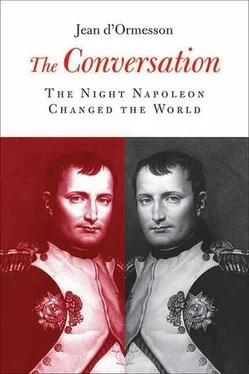Jean d'Ormesson
The Conversation
Tout arrive par les idées; elles produisent
les faits, qui ne leur servent que d’enveloppe.
Chateaubriand
Mon admiration pour Bonaparte a toujours été
grande et sincère alors même que j’attaquais
Napoléon avec le plus de vivacité.
Chateaubriand
PROLOGUE CROSSING THE RUBICON
There are moments when historical events seem poised to reveal their full significance: Alexander the Great at the head of his army, on the verge of taking on the vast and inexhaustible Persian Empire; Hannibal preparing to cross the Alps with his elephants, to strike at the heart of Rome; Caesar, of course, standing on the banks of the Rubicon; dawn on June 17, 1940, in Bordeaux, that instant before General Charles de Gaulle climbed into General Edward Spears’ plane — bound for London, and for what appeared a hopeless, if glorious, act of resistance.
The moment I will try to capture here involves Napoleon Bonaparte, at the height of his adoration by the French people, whom he has pulled back from the abyss created by years of chaos and misrule. He is on the brink of declaring himself Emperor of France.
We must keep in mind what led up to this moment. In November 1799, the thirty-year-old Bonaparte, just returned from conquering Egypt, triumphed over the Vicompte de Barras, head of the Directory, and, with assistance from his brother, Lucien, and Abbé Sieyès, succeeded in his coup d’état on 18 Brumaire in the Revolutionary Year VIII, ending the Directory’s four-year rule. The five directors (only the first two really counted) — Barras, Sieyès, Louis-Jérôme Gohier, Roger Ducos, and Jean-François Moulin — were replaced by a Consular Committee ( commission consulaire ), consisting of three members — Sieyès, Ducos, and Bonaparte himself. This would itself soon be replaced, following the terms of a new Constitution, by yet another triumvirate: Bonaparte, who was to be called First Consul; Jean-Jacques Régis de Cambacérès, Second Consul; and Charles-François Lebrun, Third Consul. The First Consul held the true power. The others were mainly advisers.
At the start of the Consulate, France was in a perilous state. Business and industry were a shambles. Industrial output had diminished by 60 percent in Paris, and by 85 percent in Lyon. The ports of Marseille and Bordeaux were effectively closed. The network of roads had been destroyed. Coach service had become completely unreliable. Everywhere, and especially in Provence and in the West, roving bands of brigands operated almost uncontested. The forests and fields were devastated. The currency had been devalued by 99 percent. The state’s coffers were empty; soldiers and government employees complained they were due a year’s-worth of salary. There were no taxes, no budget, no balance sheets. The country had lost its way and become victim to every form of excess and abuse. For four years, from Revolutionary Year VIII until XII, meaning from the end of 1799 until the beginning of 1804, Bonaparte worked tirelessly to get France back on its feet.
In February 1800, three months after the coup of 18 Brumaire, a referendum on the Consulate resulted in more than three-million Frenchmen voicing their support for Bonaparte; a mere 1,500 opposed him. The First Consul moved into the former royal palace in the Tuileries, then into the one in Saint-Cloud. He founded the Banque de France; sealed the borders and declared amnesty for those who had already immigrated; stage-managed the Concordat of 1801, restoring to the Roman Catholic Church its civil status; revamped public education; created the lycée school system and the Légion d’honneur; and minted the first French franc — in his own image. He also crossed the Grand-Saint-Bernard alpine pass and won a victory over the Austrians at the Battle of Marengo; and in 1802 he signed the Treaty of Amiens, establishing diplomatic relations with England, Spain, and Holland. In that same year of 1802, Bonaparte, who had already been elected for another tenyear term, appointed himself First Consul for Life and established a new Constitution, which was duly approved by an overwhelming majority and which further extended his powers.
When did the idea of becoming emperor — of joining the ranks of the Merovingians, the Carolinians, the Capetians, the Valois, and the Bourbons — first take hold in Bonaparte’s mind? It is hard to say. By the early months of 1804, with the execution of Georges Cadoudal, a leader of the Royalist Chouannerie uprising, and the suicide of General Jean-Charles Pichegru, and especially the seizure of German territory and the execution of the Louis Antoine de Bourbon, Duc d’Enghien, the last descendant of the House of Condé, Bonaparte had fulfilled enough pledges of the Revolution — fulfilled in every possible sense of the word — to aspire openly to an imperial throne. I have therefore set the action of this book, a decisive conversation between Bonaparte and Cambacérès, slightly earlier, during the course of the winter of 1803–1804.
Every word of Bonaparte’s part of this conversation, imaginary though it is, was actually said or written by the First Consul at one time or another, and taken from contemporary accounts, reports, and memoirs. Putting words into Bonaparte’s mouth would have been an absurd idea. Even the story of Josephine’s shawl, coveted by her sister-in-law Caroline Murat, appears in documents of the period.
On the other hand I have taken liberties with Cambacérès, the future Duke of Parma. Cambacérès was a far less significant figure and what he has to say therefore carries less weight. I have made most of it up.
Born in Montpelier, a counselor at the cour de comptes — the court of auditors — of that town, president of the criminal tribunal of Hérault, Cambacérès was fifteen years older than Bonaparte at the beginning of 1804. As an elected member of the Convention Nationale, he had voted “with reservation” for the execution of Louis XVI. Minister of Justice under the Directory, he was named Second Consul on the recommendation of Sieyès and Bonaparte. Compared to Lebrun, the more austere Third Consul, Cambacérès, in the eyes of his countrymen, was the very embodiment of the revolutionary tradition. He played an essential role in composing the Code civil , or Napoleonic Code, and, as president of the Senate and of the Conseil d’État, he would act as Bonaparte’s plenipotentiary during the emperor’s absence on military expeditions. His title was “Archchancellor of the Empire” (in addition to Duke of Parma). Cambacérès would later support the Bourbons in their bid to return to power in 1814, then shift his support back to Napoleon during the Hundred Days. He was exiled in 1815, eventually returning to France and dying in Paris in 1824.
I chose Cambacérès as Bonaparte’s interlocutor for several reasons. First, because he was Second Consul to Bonaparte’s First Consul. Each one naturally operated from a very different level of authority, but they were the two most important figures of the Consulate. Moreover, Cambacérès was highly intelligent, loyal, and flexible — perhaps a little too flexible — as well as politically adept — perhaps a little too adept. A republican and regicide (“with reservation”), Cambacérès also seemed to stand for the revolutionary spirit that seemed placed at risk by Bonaparte’s rise to power, a rise that he, Cambacérès, hoped to control. Little wonder that the First Consul would try to circumvent him.
Lastly, I have chosen Cambacérès because Bonaparte was very often surrounded by the generals who were constantly at his side on the field of battle. These sabreurs , as he sometimes called them, were blindly loyal to him and less at home in the world of language and concepts than they were in the theater of war. The future Duke of Parma was perhaps the only civil figure to get close to the Victor of Marengo, the future Victor of Austerlitz, and, with Talleyrand — Charles Maurice de Talleyrand-Périgord — one of the few in Napoleon’s immediate entourage who could engage him in discourse over matters of state.
Читать дальше












